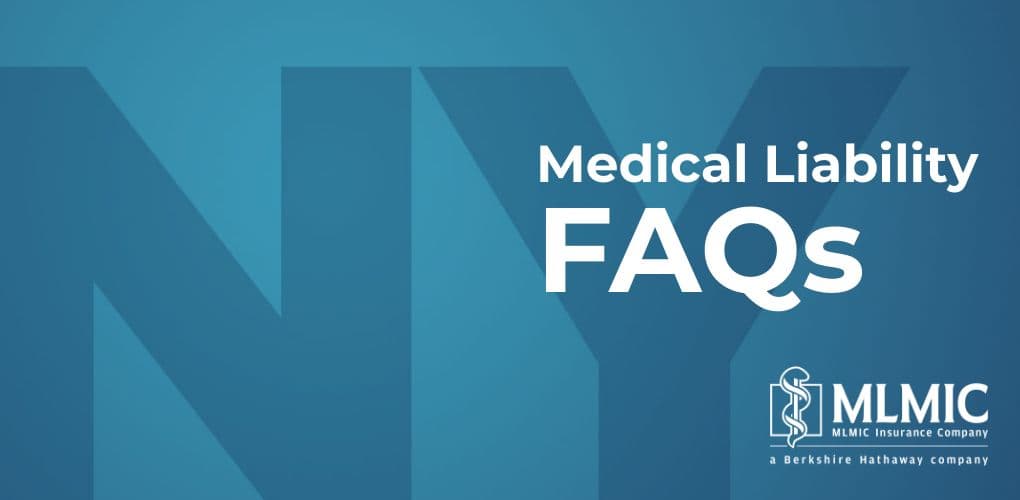< Back to Publications & Resources
Attorneys Respond to Medical Professional Liability FAQs on Informed Consent

During the course of a year, the attorneys at Fager Amsler Keller & Schoppmann, LLP, counsel to MLMIC Insurance Company, handle approximately 5,000 questions from policyholders on professional liability, risk management and healthcare law. Frequently, the questions asked by healthcare professionals involve requests for legal guidance on informed consent.
Here, we’ve paired the FAQs on medical professional liability related to informed consent with the attorneys’ responses.
What is informed consent, and who is responsible for procuring it?
Informed consent is the legal doctrine affirming a patient’s right to determine and control his/her own medical treatment. In essence, it is the discussion that takes place between the physician who is rendering care and the patient. The informed consent discussion may not be delegated to any staff member. It is the responsibility of the treating physician to provide information and explanations that will assist patients in their decision-making process.
In other words, the patient must be afforded the opportunity to evaluate adequate information before making a decision. The treating physician must advise the patient of the usual risks, benefits and alternatives of the proposed treatment or procedure, including the option of no treatment, the risks of the alternatives and, specifically, a few of the most severe and most frequent risks.
Failure to procure an adequate informed consent from the patient can lead to both malpractice litigation and charges of professional misconduct. This also may be an indication of inadequate physician-patient communication. The patient’s consent must be voluntary, competent and informed. The patient must have capacity, i.e. the ability to understand the nature and consequences of the treatment.
Although a signed consent form is helpful in defense, a patient’s signature is not conclusive evidence of an informed consent discussion. The signed consent document merely confirms that such a discussion took place. A witness to the consent document merely confirms that the patient has read and understood the document, appeared to have capacity for the purpose of giving consent and has signed the form.
For what procedures should an informed consent be obtained?
Although it is always good practice and important for a physician to explain to a patient the treatment he/she is rendering, obtaining an informed consent in New York State is only statutorily necessary for a non-emergency treatment, procedure or surgery, or if the diagnostic procedure involves an invasion or disruption of the integrity of the body. A physician is not required to obtain an informed consent if the procedure is an emergency and necessary treatment would be delayed by trying to obtain consent. If a physician is in doubt as to whether a diagnostic procedure falls into the second category, it is a good idea to err on the side of obtaining an informed consent.
What is the legal definition of a minor, and can minors give informed consent?
Generally, the New York statute states that persons under the age of 18 are minors. And, when the patient is a minor, consent for his/her medical treatment must be obtained from the parent or legal guardian.
There are some exceptions:
- If there is an emergency and the person is in need of medical attention, and an attempt to secure consent would result in delay of treatment which would increase the risk to a person’s life or health, parental consent is not necessary.
- If a person is married or has borne a child, he/she can give consent for his/her self as well as for the child.
- If a person is pregnant or sexually active, or has questions relating to sexual behavior, the person can give his/her own consent to the care and treatment rendered, i.e. abortion, contraception or treatment of STDs.
- Any person in a parental relationship to the child (as defined by the statute) may give consent for the immunization of a child, unless this person knows the child’s parent objects to the immunization.
- A minor may also consent for treatment or testing in other limited situations, i.e. for HIV testing and treatment, voluntary out-patient mental health assessment and treatment under certain circumstances, and a 17-year old may consent to give blood.
- Any medical provider who acts in good faith, based on the representation by a person that he/she is eligible to consent, shall be deemed to have received effective consent.
In addition to having the consent formed signed, should I write a note in the chart after I have an informed consent discussion with a patient?
Absolutely, yes. The note should be dated and should state the following:
- “The risks, benefits and alternatives, including no treatment, were discussed with the patient. The risks discussed included but were not limited to . . .” (list a few of the most severe and a few of the most frequent risks or complications); and
- “The patient understood, had all his/her questions answered and consented to the treatment or procedure.”
This type of documentation will confirm and be evidence that a discussion actually took place with the patient.
The attorneys of Fager Amsler Keller & Schoppmann, LLP (FAKS) perform thousands of hours of professional liability services per year. They are uniquely qualified to assess medical-legal issues and provide counsel to minimize liability exposure. MLMIC policyholders can reach 24/7 legal support services by calling (855) FAKS-LAW or emailing hotline@FAKSLAW.com. For more information about these services, offered exclusively to MLMIC policyholders, visit our web page on Legal 24/7.



